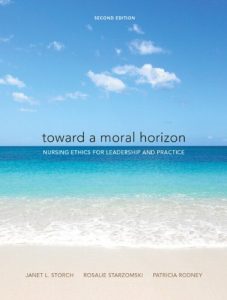Toward a Moral Horizon: Nursing Ethics for Leadership and Practice
Pearson Canada, 2nd Edition – Jan 3 2012
by Janet L. Storch, Patricia Rodney, Rosalie Starzomski

By Rosalie Starzomski, RN, PhD
As a result of our collaboration and research in the area of ethics, our work on ethics committees and our numerous clinical and academic ethics consultations, Dr. Jan Storch, Dr. Paddy Rodney and myself decided that it was important to write and offer a course for graduate students that would incorporate the findings of this work as well as the research and philosophical perspectives of others in the field of nursing ethics. The course, entitled, Nursing Ethics for Leadership and Practice, has been offered for over ten years as part of the graduate program in the School of Nursing at the University of Victoria. As there was no appropriate textbook available for such a course, we decided to develop an edited text, and engaged many of the scholars in the area of ethics as contributors. Thus the book, Toward a Moral Horizon: Nursing Ethics for Leadership and Practice, was created. We have recently published a revamped second edition with many new chapters, and a revision of existing chapters from the first edition.
As authors of the book and course, we recognize that nurses have always had to deal with a variety of ethical challenges. However, it is only in the last three decades, that nurse scholars, as well as senior nurse leaders and have identified nursing ethics as a unique area of inquiry. Since the mid-eighties, significant advances have been made in defining the academic and practice knowledge that comprises nursing ethics. The dominance of medical ethics (ethics related to medical practice), and bioethics (ethics related to biomedicine) has long seemed too limiting for nursing practice. Although bioethics and medical ethics have contributed to nursing ethics, we, like other nurse ethicists, believe nursing ethics to be distinct from both. In other words, while nursing ethics has drawn from some of the same traditions and theories as medical ethics and bioethics, we have become more aware of the unique needs and unique contributions of nurses. It is important to note that nurses’ ethical concerns have not been adequately addressed in either medical ethics or bioethics. Many
involved in the scholarship of ethics, as well as nurses providing direct care, have found the ethics of nursing practice to be separate and distinct. Nursing is a profession with a moral mandate that differs from the medical mandate in that nurses address the full diversity of patient, family and community needs, with less emphasis on cure. Further, nurses occupy a unique moral in-between position in that they are answerable not only to patients or clients but also
to organizations. Now that ethics has been more fully recognized as an integral part of the nursing profession, there is a need to continue to explore and define the parameters of nursing ethics. Through our clinical and scholarly work, we continue to move toward that moral horizon.
Rosalie Starzomski is Associate Director Research and Scholarship and Professor at the UVic School of Nursing.
From the 2012 Autumn Communiqué — Nursing Ethics
Recent Comments